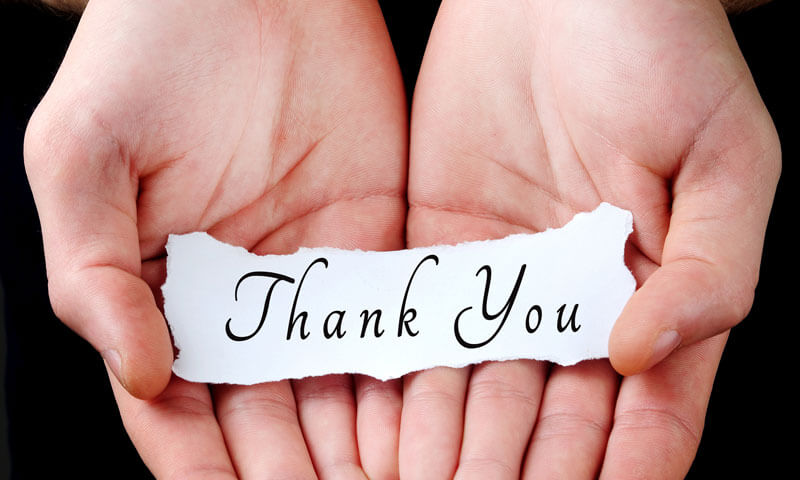
Answer:
Dear T.J.,
Sending a well-written thank-you note to those who interviewed you is certainly a classy gesture. It could potentially differentiate you from other candidates. And people generally appreciate sincere thanks. Some surveys have shown that thank-you notes make an impact on hiring decisions. However, you must be careful to proofread, check for misspellings, and keep the content appropriate. Thank-you notes are a great idea when done well, but mistakes will make interviewers question your work product.
Below, I will examine the issue of thank-you notes in greater detail:
Will sending a thank-you note help your chances of securing the position? According to CareerBuilder, "Nearly 15 percent of hiring managers say they would not hire someone who failed to send a thank-you letter after the interview. Thirty-two percent say they would still consider the candidate but would think less of him or her." Think of thank-you notes as part of your "campaign" to get the job. A failure to send them could actually hurt your chances!
A thank-you note can set you apart from other candidates. Let's say you're the head of the corporate practice group at a large law firm, and you just interviewed two really stellar candidates. Both had simply terrific interviews, but you only have one offer to give. The next day, you receive a sincere note handwritten on beautiful stationery from one of the candidates. This candidate, in her note, in essence has asked for the job and expressed her extreme interest in the position. In this partner's experience, highly interested candidates end up working very hard and doing tremendous work. At this point, the partner will likely begin to lean toward this candidate and give her the offer.
A thank-you note can remind the firm of your candidacy. If you are one of 10 candidates who interview for a position, then it will become difficult for the interviewers to clearly remember you and the answers you gave during the interview. Sending a thank-you note is a good opportunity to remind the firm of your candidacy and to make a stronger impression on their minds.
A thank-you note gives you an opportunity to ask for the job. Now, I'm not saying you need to be highly aggressive or pushy in your thank-you notes. But you should mention that you would really like the position and why. When I help my candidates with interview preparation, I often tell them to make sure that, as a closing note, they express their interest in actually receiving an offer. Firms like to hear that you are interested as well. It's a two-way street! And a thank-you note is another venue for you to get this point across. Furthermore, it is also the very last chance you have to make an impression.
The email vs. handwritten note conundrum. I probably get this question the most these days. Are emailed thank-you notes appropriate in this day and age? Various opinions abound, leading many candidates to be confused. In short, either is fine.
I happen to think handwritten notes make a great impression and also show that the candidate spent more time on the note's composition. But while a handwritten note will gain you serious style points à la Jacqueline Kennedy Onassis, it does lack speed. There is no doubt that email is a much faster alternative. And if a firm indicates that it will be making a quick decision, I actually suggest emailing thank-you notes. Furthermore, not everyone has a big box of Crane's personalized stationery sitting in his or her desk. If you don't have thank-you notes on hand, do not wait to send them until you've bought a box. Just send emails.
Further, if writing out handwritten notes is so daunting that you think your dread might actually prohibit you from doing it, then you've got to go with emails. Also, ask yourself this: "Do people often compare my handwriting to a prescribing physician's?" If the answer is "yes," then do the reader a favor and email your note.
Even if you don't receive the offer or even want one, sending a thank-you note can be a good networking opportunity. It's very possible you may not end up working for the firm where you interviewed for some reason, but an interview is a great way to make contacts and expand your network. You never know where people will ultimately end up, and it's possible that a partner could transition to your current firm and you could end up working for him or her anyway. You would want that person to have a favorable opinion of you, right? Friendly relationships can help you go a long way in the law. Furthermore, it just makes good business sense to have strong contacts in a variety of firms and corporations. A thank-you note helps continue and strengthen the relationship.
So, what are the rules for sending thank-you notes?
Learn why attorneys usually fail law firm phone-screening interviews in this article:
See the following articles for more information:
- See Top Ten Interview Questions for more information
- See Interviewing Tips for more information
A thank-you note can set you apart from other candidates. Let's say you're the head of the corporate practice group at a large law firm, and you just interviewed two really stellar candidates. Both had simply terrific interviews, but you only have one offer to give. The next day, you receive a sincere note handwritten on beautiful stationery from one of the candidates. This candidate, in her note, in essence has asked for the job and expressed her extreme interest in the position. In this partner's experience, highly interested candidates end up working very hard and doing tremendous work. At this point, the partner will likely begin to lean toward this candidate and give her the offer.
A thank-you note can remind the firm of your candidacy. If you are one of 10 candidates who interview for a position, then it will become difficult for the interviewers to clearly remember you and the answers you gave during the interview. Sending a thank-you note is a good opportunity to remind the firm of your candidacy and to make a stronger impression on their minds.
A thank-you note gives you an opportunity to ask for the job. Now, I'm not saying you need to be highly aggressive or pushy in your thank-you notes. But you should mention that you would really like the position and why. When I help my candidates with interview preparation, I often tell them to make sure that, as a closing note, they express their interest in actually receiving an offer. Firms like to hear that you are interested as well. It's a two-way street! And a thank-you note is another venue for you to get this point across. Furthermore, it is also the very last chance you have to make an impression.
The email vs. handwritten note conundrum. I probably get this question the most these days. Are emailed thank-you notes appropriate in this day and age? Various opinions abound, leading many candidates to be confused. In short, either is fine.
I happen to think handwritten notes make a great impression and also show that the candidate spent more time on the note's composition. But while a handwritten note will gain you serious style points à la Jacqueline Kennedy Onassis, it does lack speed. There is no doubt that email is a much faster alternative. And if a firm indicates that it will be making a quick decision, I actually suggest emailing thank-you notes. Furthermore, not everyone has a big box of Crane's personalized stationery sitting in his or her desk. If you don't have thank-you notes on hand, do not wait to send them until you've bought a box. Just send emails.
Further, if writing out handwritten notes is so daunting that you think your dread might actually prohibit you from doing it, then you've got to go with emails. Also, ask yourself this: "Do people often compare my handwriting to a prescribing physician's?" If the answer is "yes," then do the reader a favor and email your note.
Even if you don't receive the offer or even want one, sending a thank-you note can be a good networking opportunity. It's very possible you may not end up working for the firm where you interviewed for some reason, but an interview is a great way to make contacts and expand your network. You never know where people will ultimately end up, and it's possible that a partner could transition to your current firm and you could end up working for him or her anyway. You would want that person to have a favorable opinion of you, right? Friendly relationships can help you go a long way in the law. Furthermore, it just makes good business sense to have strong contacts in a variety of firms and corporations. A thank-you note helps continue and strengthen the relationship.
So, what are the rules for sending thank-you notes?
- Do not send the same note to every person. Vary your messages. I have heard many attorneys say they compare notes with their colleagues to see if the candidate wrote the same note for every person.
- Try to send thank-you notes as soon as possible.
- Thank the recruiting coordinator. A lot of attorneys forget this, and a good recruiting coordinator can have a lot of power in hiring decisions.
- If you are only going to send one thank-you note, then thank the hiring partner or the partner with whom you spent the most time.
- Don't say you're a "perfect fit" after a screening interview. You don't have enough information at this point, and you will look foolish or naïve.
- Be formal, but keep it brief.
- If sending a handwritten note, use good paper. If you don't have good monogrammed paper at this point in your career, then add this purchase to your to-do list. Style points can go a long way when interviewing.
- Spell check. Spell check. Spell check. If you are handwriting your notes, then you need to be doubly sure that you aren't misspelling something. Consider typing out what you want to say in Microsoft Word before transcribing it to your note. If you don't show attention to detail in your thank-you notes, then how might your work product look?
- Focus on content, and avoid too many adjectives. Tell the reader what you gained from the interview instead and what appeals to you about his or her practice.
Learn why attorneys usually fail law firm phone-screening interviews in this article:
See the following articles for more information:
- 21 Major Interview Mistakes to Avoid at All Costs
- The Best Way to Prepare for a Job Search and Interviews
- How to Talk About Other Interviews in Your Interviews
- How to Answer the Tell Me About Yourself Interview Question
- How to Answer the Do You Have Any Questions for Me Interview Question




